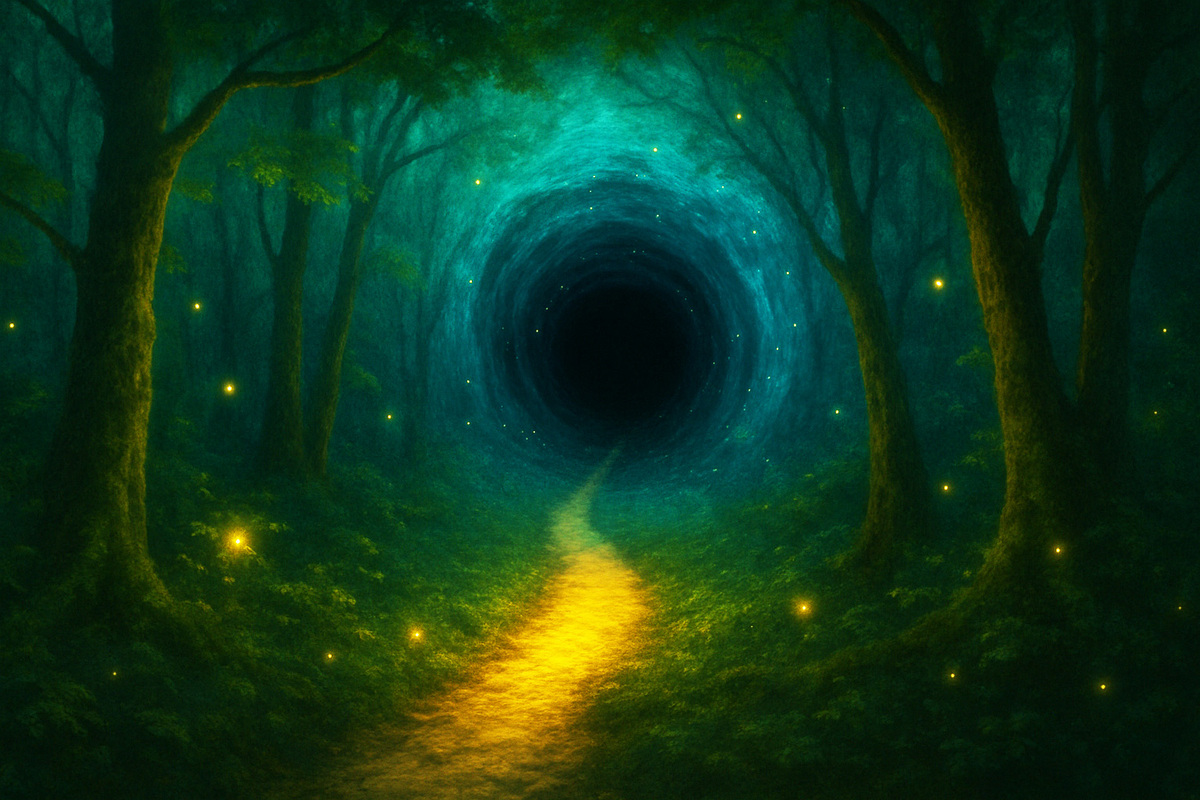Dear friend,
Much of our world today speaks the language of Reason—facts, logic, proofs.
It is a powerful and necessary tongue.
It has built bridges, cured diseases, carried us into the stars.
But it is not the only language we need.
There are times when Reason falls short—
when the heart breaks,
when the ground vanishes beneath our feet,
when the bright certainties of Life dissolve into shadow.
In such moments, it is not logic we reach for, but something more primal:
Story.
Myth.
Symbol.
The deep language of the soul.
I think of the left brain as the mind—the realm of reason and logic;
and the right brain as the soul—the realm of emotion and intuition.
For better and worse, we human beings are made of both.
Reason is like a focused, bright flashlight.
It helps us see immediate things, make sound decisions, mend what can be mended.
But the soul is a vast cavern.
The light of Reason can show us small corners of it—enough to walk a few steps safely.
But it cannot show us the whole.
It shines the wrong kind of light.
It cannot illuminate the enormity, the hidden oceans of longing, grief, and wonder that live and breathe within us.
For that, we need another kind of knowing.
A knowing that listens to echoes, that maps by memory and symbol, that feels its way along unseen walls.
For that, we need Story.
Carl Jung, the great explorer of the human soul, called these deep symbolic patterns “archetypes”—
living maps of the inner life we all share.
The best myths are not just old stories.
They are mirrors and guides, showing us how to walk through loss, transformation, and rebirth.
One of the oldest—and most important—is the myth of the Underworld.
It comes in many forms:
Persephone, stolen from the bright fields of her childhood and dragged down into the Abyss.
Inanna, descending through seven gates, surrendering all she carried.
Orpheus, walking willingly into Darkness for the sake of love.
The Underworld is not a fantasy.
It is an experience every soul will one day know:
A sudden loss.
A shattering diagnosis.
A betrayal.
A death.
A door that closes and will not reopen.
The Underworld does not ask for permission.
It simply opens — slowly, inexorably, irresistibly.
We must walk differently here—by intuition, by ancient memory.
One clear guide through this dark terrain is the story of Orpheus.
He was the greatest musician of his day, it was said—
his music so powerful it could charm stones, rivers, even the dead.
When his beloved Eurydice died, bitten by a snake, Orpheus could not bear her loss.
He took his lyre, and descended into the Land of Shadows.
Through the dark halls of the Underworld he walked, singing.
Even the stony-hearted gods wept to hear him.
Moved by his sorrow, Hades and Persephone agreed to release Eurydice—
On one condition:
Orpheus must not look back at her until they had both fully returned to the living world.
He agreed.
Step by step, he climbed upward, Eurydice silently behind him, unseen, unfelt.
And near the threshold of the living world—so close—
doubt seized him.
Was she truly there?
Was it all a cruel illusion?
Orpheus turned.
And in that instant, Eurydice vanished—into the abysmal depths.
He had descended for love.
He returned with only sorrow—and a music the world had never heard before.
This is the part of the story many leave untold:
Orpheus did not simply fail.
He paid the true price of descent.
He lost what he most loved—
the very thing for which he had braved the Descent.
But he carried something else back:
A song shaped by loss, tempered by grief, strong enough to outlast death itself.
A song that could not have been born in the fields of light.
A song that could only be forged underground, among shadows and echoes.
So it is for us.
The journeys that wreck us do not always return what we lost.
Sometimes they return us, changed.
Bearing a music we could never have learned without walking through shadow.
Birthing a new music within us—
a music we could never have learned without walking through darkness,
without losing what we thought we could not live without.
And it is this music, our new song born of dark night, that we and the world most desperately need.
Soulfully yours,
William
P.S. I call this format “poessay” — a fusion of poem and essay. Hope you liked it!
![]()
Thank you for reading GrailHeart!
Your thoughts and suggestions are always welcome—I personally respond to all sincere inquiries. (I summarily banish spam to the outer darkness.) You can reach me through my contact form.
May your seeking lead to Wisdom, your challenges foster Courage, your path nurture Serenity, and your heart extend Compassion.



Leave a Reply